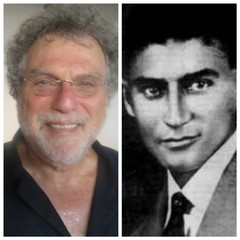|
Back
Passions of the Committed Composer New York
Noguchi Museum, Long Island City, Queens
09/11/2016 -
“Bang on a Can” presents the Artists at Noguchi Series:
Martin Bresnick: Songs of the Mouse People – Josephine The Singer – Going Home – String Quartet No. 2 “Bucephalus”
Ian Rosenbaum (Vibraphone), Tim Gocklin (Oboe), Argus String Quartet: Jason Issokson, Clara Kim (Violins), Diana Wade (Viola), Joann Whang (Cello)

M. Bresnick/F. Kafka (© Samuel A. Dog/Wikipedia Commons)
” Wee, sleeket, cowran, tim’rous beastie,/O, what a panic’s in thy breastie!”
Robert Burns
For one of America’s most distinguished professors and most respected composers, Martin Bresnick celebrated his 70th birthday being...well, kind of ornery.
Two of the four chamber works presented at the Noguchi Museum yesterday afternoon were about mice. The final work was about a horse. Though, granted, the horse was Bucephalus, the great steed of Alexander the Great. A horse also celebrated, as Mr. Bresnick acknowledged, by both Bertolt Brecht and Franz Kafka. The mice too were from Kafka, taken from his final story. Which (in its way) was about music and art as well.
Where his Yale colleague David Lang decorates his words with music, Mr. Bresnick, somewhat more ideological than literary, translates words and pictures into pure musical form. I first heard this first two months ago in his trope on two poems of Bertolt Brecht, And I Always Thought. The name referred not only to the great warhorse, but Kafka’s reembodiment of the horse as a lawyer. Yet it was the German Communist Brecht who saw the horse in a different light:
“Every page a victory/Who cooked the feast for the victors?/Every ten years a great man./Who paid the bill?”

Argus String Quartet (© Ben Gibbs)
This Second String Quartet was Mr. Bresnick’s longest and far most complex work of the afternoon. The five movements were structurally bewildering to this first-time listener. But even at its most recondite, one felt an intensity of feelings. They were harsh, gentle, sometimes elegiac (the second movement, Around To the Sun had a Copland sense of consonance and nostalgia), and seriousness.
(Though one can’t help thinking that the third movement Alexandrine might employed Alexandrine meter in the music. If so, I didn’t happen to catch it.)
One didn’t listen so much to finesse and perfection of the composer’s colleagues at Yale, the Argus Quartet, as to its luminosity, its kinetic energy both in the frequent solos and the ensemble playing. Nor do I apologize for not catching the Bucephalus architecture: the emotions were their own reward.
Mr. Bresnick divided the Kafka story into two parts. Opening was a duet between cellist Joann Whang and vibraphonist Ian Rosenbaum. Neither of them squeaked their way through this nine-minute work. But the high cello sounds and the mordant vibraphone solos gave more than a literal picture of Kafka’s metaphorical rodents.
And Robbie Burns would have taken sheer delight.
Added to this was Josephine The Singer, Kafka’s artist who sings for appreciation from a people (mouse people) who have little use for art. In this case, violinist Jason Issokson was the violin soloist. And one didn’t need Kafka for a work which could stand on its own. Like most violin solos, it could have been partly Bach, partly Ysaye, and vaguely Hungarian. It was indeed, though, violin cantabile, and sung splendidly by Mr. Issokson.
The one non-literary work was a personal one from Mr. Bresnick, Going Home, written for violin, viola, cello and the composer’s own first instrument, the oboe, was based on a trip he took to his grandparents’ home now in Belarus. It was, like Dvořák’s original Going Home, a music of pure nostalgia. The plaintive falling minor second, played by oboist Tim Gocklin, against the murmuring of the strings, was, yes, shtetl Jewish, the sounds were simple, almost pastoral.
Mr. Bresnick, a student of such iconic figures as György Ligeti, is the consummate composer. Yet, in Going Home, as in all his music, one feels an urge, no, a compulsion to use his great musical scholarship to produce a narrative, an integrity and an unashamed passion.
Harry Rolnick
|